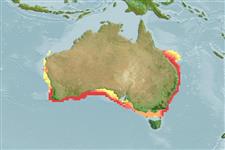Elasmobranchii (tubarões e raias) (sharks and rays) >
Orectolobiformes (Carpet sharks) >
Orectolobidae (Carpet or nurse sharks)
Etymology: Orectolobus: orektos (Gr.), stretched out; lobus (L.), from lobos (Gr.), rounded projection or protuberance, referring to long nasal barbels of Squalus barbatus (=O. maculatus). (See ETYFish); maculatus: Latin for spotted, referring to large, 0-shaped markings that densely cover dorsal surface. (See ETYFish).
More on author: Bonnaterre.
Environment: milieu / climate zone / depth range / distribution range
Ecologia
marinhas associadas(os) a recifes; intervalo de profundidade 0 - 248 m (Ref. 106604), usually 0 - 110 m (Ref. 247). Temperate; 20°S - 40°S, 113°E - 154°E
Eastern Indian Ocean: southern Australia, from Western Australia to southern Queensland. Records from Japan and the South China Sea need to be confirmed.
Length at first maturity / Tamanho / Peso / Idade
Maturity: Lm ?, range 60 - ? cm
Max length : 320 cm TL macho/indeterminado; (Ref. 247); common length : 180 cm TL macho/indeterminado; (Ref. 247)
Espinhos dorsais (total): 0; Raios dorsais moles (total): 0; Espinhos anais 0; Raios anais moles: 0. Back dark, with light O-shaped markings obscuring darker saddles (Ref. 13577). Caudal fin with its upper lobe hardly elevated above the body axis, with a strong terminal lobe and subterminal notch but no ventral lobe (Ref. 13577).
Found on the continental shelf, from the intertidal down to at least 110 m (Ref. 247). Commonly on coral and rocky reefs, under piers, and on sand bottom (Ref. 247). May occur in water barely deep enough to cover the fish, and has been observed climbing ridges between tide pools with its back out of water (Ref. 247). Nocturnal (Ref. 247). Feeds on bottom invertebrates (Ref. 247), including crabs, lobsters and octopuses (Ref. 43278), and bony fishes (Ref. 247), like sea bass, scorpionfishes and luderick (Ref. 43278). Ovoviviparous (Ref. 43278, 50449), with up to 37 pups in a litter (Ref. 247). Known to bite people that step on it or put their feet near its mouth, and can and will bite when molested and provoked (Ref. 247). Flesh highly regarded and sometimes utilized for human consumption (Ref. 247). Skin sometimes utilized for leather (Ref. 247). Regarded as pest by lobster fishers (Ref. 247).
Ovoviviparous, embryos feed solely on yolk (Ref. 50449). One female had 37. Size at birth about 21 cm. Some anecdotal accounts regarding courtship are given. It is said that males in captivity fight vigorously among themselves while courting females. In the process, females are bitten by males in the gill region and one clasper is inserted. In the wild, the males are attracted to the females by some chemical pheromones possibly released by the latter during the breeding season.
Compagno, L.J.V., 1984. FAO Species Catalogue. Vol. 4. Sharks of the world. An annotated and illustrated catalogue of shark species known to date. Part 1 - Hexanchiformes to Lamniformes. FAO Fish. Synop. 125(4/1):1-249. Rome, FAO. (Ref. 247)
Categoria na Lista Vermelha da IUCN (Ref. 130435)
Utilização humana
Pescarias: pouco comercial
Mais informação
ReferênciasAquaculturaPerfil para aquaculturaEstirpesGenéticaElectrophoresesHereditariedadeDoençasProcessamentoNutrientsMass conversion
Ferramentas
Relatórios especiais
Descarregue XML
Fontes da internet
Estimates based on models
Preferred temperature (Ref.
123201): 15.3 - 24.4, mean 18 °C (based on 290 cells).
Phylogenetic diversity index (Ref.
82804): PD
50 = 0.5012 [Uniqueness, from 0.5 = low to 2.0 = high].
Bayesian length-weight: a=0.00389 (0.00180 - 0.00842), b=3.12 (2.94 - 3.30), in cm total length, based on all LWR estimates for this body shape (Ref.
93245).
Nível Trófico (Ref.
69278): 4.2 ±0.64 se; based on food items.
Generation time: 5.5 ( na - na) years. Estimated as median ln(3)/K based on 1
growth studies.
Resiliência (Ref.
120179): Baixo, tempo mínimo de duplicação da população 4,5 - 14 anos (Fec=37).
Fishing Vulnerability (Ref.
59153): High vulnerability (61 of 100).
Nutrients (Ref.
124155): Calcium = 2.26 [0.36, 9.58] mg/100g; Iron = 0.116 [0.027, 0.322] mg/100g; Protein = 20.2 [17.9, 22.4] %; Omega3 = 0.234 [0.093, 0.566] g/100g; Selenium = 12.4 [3.3, 39.0] μg/100g; VitaminA = 14.1 [3.5, 52.4] μg/100g; Zinc = 0.248 [0.117, 0.533] mg/100g (wet weight);
